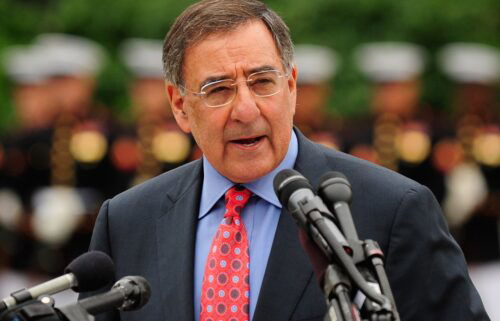‘You can’t just remove the damage of the last four years’

For more than four years, countries that rely on American foreign aid have been reeling from the profound impact that Donald Trump’s reinstatement of the Mexico City policy has had on women.
The policy, known as the “global gag rule” among opponents, prevents non-government organizations that provide abortions, give counseling about abortions, or advocate for safe access to abortion from receiving US funding.
But while the policy is meant to stop abortions, research shows that it has the opposite effect — and with deadly consequences for women. One 2019 study published in The Lancet found that during previous periods when the policy was in effect, abortions increased by 40% compared to periods where it was rescinded, contraceptive use dropped by 13.5% and pregnancies rose by 12%.
On Thursday, US President Joe Biden rescinded the policy through a presidential memorandum, with reproductive rights advocates hailing it as a victory for the health and lives of women, girls and people who can become pregnant.
During a signing ceremony in the Oval Office, Biden said the move will “reverse my predecessor’s attack on women’s health access.”
He added that the measure “relates to protecting women’s health at home and abroad, and it reinstates the changes that were made to Title X (a family planning program that prohibits federal funds from being used for abortions) and other things making it harder for women to have access to affordable health care as it relates to their reproductive rights.”
While the announcement has been welcomed by women’s rights groups and their advocates, and they are working toward a permanent repeal, they stress that the collateral damage of the Trump-era policy is vast, and that it will take more than just an announcement to rebuild entire health systems fractured by the policy.
That’s because while previous incarnations of the rule under other Republican presidents primarily targeted family planning programs, Trump’s supersized version (the Protecting Life in Global Health Assistance policy) impacted a wide spectrum of US funded health programs, spanning from HIV/AIDS prevention and treatment to malaria, tuberculosis, food, water, and sanitation programs.
In 2019, Trump took that policy a step further, announcing the withdrawal of funding from any organization that provides funding to other groups that carry out abortions or discuss abortions with their clients.
In total, the Trump administration’s expansion of the rule increased the amount of money affected by the policy by nearly 20-fold, from approximately $600 million to an estimated $12 billion.
The loss of that funding cannot be overstated, according to organizations who refused to comply with Trump’s policy.
MSI Reproductive Choices, a global non-profit that provides family planning advice and sexual health services, is one of them. The group said in a 2020 report that they lost $30 million in funding, money that over the course of Trump’s term they say would have served an estimated 8 million women with family planning services that would have prevented an estimated 6 million unintended pregnancies, 1.8 million unsafe abortions and 20,000 maternal deaths.
MSI Reproductive Choices’ Ethiopia country director Abebe Shibru, who was the country director for MSI Zimbabwe during most of Trump’s term, said the policy “undermined the rights of women to exercise their rights to reproductive health.”
Shibru told CNN that after the policy was reinstated, MSI’s outreach locations and services across Zimbabwe were slashed in half, shuttering reproductive health access for millions of disadvantaged women living in the country’s most remote areas. It’s a scenario that has been unfolding across many parts of Africa, he said, and one that will take time to repair.
“You can’t just remove the damage of the last four years,” Shibru said. “It will take time.”
A ‘chilling’ effect
Melvine Ouyo, a Nairobi-based reproductive health nurse and former clinic director at Family Health Options Kenya agrees, explaining that the effects of the policy didn’t just damage maternal health, but also impacted services including malaria, HIV and sanitation — and drove a wedge between crucial health partnerships, as groups that accepted the policy’s conditions became wary of contact with groups that did not. “They could not coordinate openly,” Ouyo said, explaining that she believes the groups who did accept the policy’s conditions were concerned about losing funding.
A United States Agency for International Development (USAID) spokesperson told CNN in November that “When a foreign NGO declines to agree to the (Protecting Life in Global Health Assistance) Policy, USAID transitions the activities that NGO would have undertaken, with US funding, to other partners, while minimizing any disruption of care.” However, a State Department review from August 2020 found that the policy did disrupt some efforts to treat tuberculosis and HIV/AIDS and to deliver nutritional assistance, among other programs.
Ouyo said that the policy created a “chilling” effect not just in Kenya but across many other countries in Africa.
“It created misunderstanding and lack of trust and made it hard for civil society groups to work in partnership,” she said.
Ouyo also detailed another unexpected outcome of the policy: self-censorship. Organizations that accepted the conditions of the rule have declined to speak openly about its impact out of concerns that it could jeopardize future funding from the US Agency for International Development (USAID), she said.
It’s an effect that has turned back the clock on reproductive rights and has halted the flow of information about reproductive rights across the globe, even in countries where abortion is legal.
Read more: How Trump has sown global chaos for women and girls
In Nepal, the legalization of abortion in 2002 is tied to a dramatic drop in maternal mortality. But research by the International Women’s Health Coalition (IWHC), which promotes reproductive health rights, found the rule had threatened to reverse those gains.
In the IWHC’s 2019 “Crisis in Care” report, which documented the impact of the policy with their partners in Kenya, Nepal, Nigeria, and South Africa, a managing director of a global gag rule-compliant organization in Nepal said that as their workers provided counseling services, people would sometimes try to speak with them about abortion, but “in such cases, we tell our staff to tell them that they don’t know anything about it” — even though abortion is legal on a national level and that staff might know about safe places to access the service.
And that’s the intended result of the Mexico City Policy’s so-called “gag,” reproductive health advocates say. The rule impedes the ability to share knowledge about the legal status of abortion and how to access safe abortion services through public health systems, with the consequence often resulting in people turning to unsafe abortion practices, reproductive rights groups and researchers say.
One lawyer said in the IWHC report that in South Africa — where abortion is also legal, but can be difficult to access — that the policy “just makes a service that was already inaccessible even more inaccessible.”
Now that the rule has been rescinded, communicating about safe abortion practices can resume, but being able to do so quickly — and effectively — with local partners on the ground will be key, said Nina Besser Doorley, Associate Director of Advocacy and Policy at the IWHC.
Doorley explained that when policy changes in the US, “it can be very slow to sort of filter its way out into the field.”
“So it’s really critical that as the policy is rescinded, that it’s also clearly communicated out. That’s one other thing I’d say is that this is a long-term problem. And it really leads to long term effects,” she said.
And the longer that it takes for those lines of communication to reopen, the longer that stigmatization and secrecy around services could linger.
“Policies like this single out abortion and take it out of health care — and silo and subject it to criteria that are based on ideology and not based on health best practices,” Doorley said.
Doorley explained the knock-on effect of the policy on health care networks.
A lot of organizations that have lost funding under the policy have had to close clinics that were often the only easily accessible clinic for an entire community. Those people currently have increased barriers to access, given that they need to travel to another place to reach a clinic — which isn’t always a financially or logistically possible. Plus, the clinics that are still open might also be facing financial difficulties as a result of the policy, and have, in turn laid off staff or dropped other services. This can all add to the overall reduction of availability and quality of care for multiple communities, she said.
“They (the Mexico City policy and subsequent expansions of the policy) increase stigma, they single it out and they put it separate from everything else,” Doorley added, explaining that clinics build up trust the longer they are in a community. If that relationship is severed by the provider closing, which many have had to do due to lack of funding under the policy, Doorley said, “you can’t just reopen the clinic, you can’t just rehire the staff. It takes time to reestablish presences and communities to rehire staff to rebuild the trust of their relationships, and all of that it’s way harder to do.”
A US congressional aide who works on global health issues agreed, telling CNN this week that “the tail of the Global Gag is very long,” and that “it’s not a matter of flipping a switch and suddenly women…have access to care they didn’t have before.”
That is one of the reasons why women’s reproductive rights groups are calling on the Biden administration to take a step further.
Playing with women’s rights
Paula Avilla-Guillen, Executive Director at the Women’s Equality Center in New York, has joined a chorus of human rights defenders who are calling on Biden to permanently repeal the rule so that it cannot be reinstated by the next president, noting that as the policy has been reinstated and rescinded along political party lines since its inception in 1984, it has left the lives of some of the world’s most vulnerable people hanging in the balance of who holds the keys to the White House.
“What we have seen over the years, is a kind of political play with women’s rights globally, by the Democrat and Republican parties,” Avilla-Guillen told CNN.
Lawmakers and advocates are now working to put a stop to that. On Thursday, Senator Jeanne Shaheen, a New Hampshire Democrat, re-introduced the Global HER Act, a bill to permanently repeal the gag rule. In the US House, Illinois Democratic Rep. Jan Schakowsky has written legislation to repeal the Helms Amendment, which remains in effect regardless of the party in power. Schakowsky’s Abortion is Health Care Everywhere Act was introduced into Congress last year, and she will re-introduce that same bill in February. The Helms Amendment was enacted in 1973 and bars the use of US foreign aid for performing abortions, not just to foreign non-profits, but to governments, multilateral organizations and US non-profits.
Schakowsky also noted the disproportionate impact the Mexico City Policy and the Helms rule have on poor women of color, saying that “these policies are clearly founded in racism that these women, these struggling women around the world, mostly black and brown, would not be able to have access to abortion.”
Even with these efforts to reverse or end the policies, Avila-Guillen said the damage of the Trump legacy will take time to undo.
“But what the Trump administration did was take one step further — a few steps forward — and only emboldened governments with overarching political power to try to restrict women and girls, as opposed to any type of equality in general.”
Read more: Biden’s decrees vault America back onto the global stage
In October, the Trump administration aimed to seal its commitment to a global fight against abortion rights access, joining a group of largely repressive governments in co-sponsoring an international nonbinding declaration that states there is “no international right to abortion, nor any international obligation on the part of States to finance or facilitate abortion.”
The Biden administration said on Thursday that it intends to withdraw co-sponsorship and its signature from the declaration, but it’s an example of how Trump’s tenure has emboldened authoritarian governments and anti-abortion groups that are still focused on dismantling any gains that women’s reproductive rights movement have made, despite the global gag rule, Avila-Guillen says.
She points to Honduras — where abortion is banned under any circumstance — and that ratified a new law into its constitution on Thursday evening that now makes abortion reform nearly impossible.
The legislation, which also prohibits legislating for equal marriage in the country, was backed by Honduran President Juan Orlando Hernández’s ruling party, who was recognized by Trump’s administration as the winner of a widely disputed election in 2017 that the Organization of American States said was marred with irregularities that called the results into question.
The move demonstrates the values that the Trump’s administration placed on women and girls, she said, explaining that its support for the Honduras government — one that has long dismissed the safety and rights of women and girls, given that Honduras is one of the most dangerous places to be a woman — is just one example.
“A lot of the political statements of the Trump administration were saying to these governments that it was ok to enact harsher laws, it was ok not to care about women and girls,” Avila-Guillen said.
She believes that it will take time to fully understand the impact that this version of the global gag rule — and the wider impact that the Trump administration’s rhetoric has had on global gender equality.
“Until we know how far back we went, we won’t know how many steps forward we need to take to catch up,” she said.



